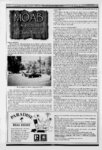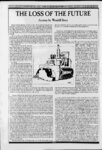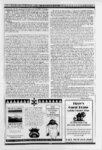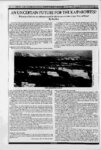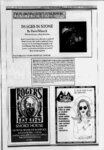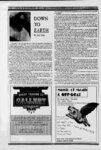| OCR Text |
Show ff.W.V.'.'.V.W.V.'W.W.?,',' l'MVAVAfAfA,lA.'. '..maamaOJa' a THE LOSS OF THE FUTURE An essay by Wendell Berry We are a remnant people in a remnant country. We have used up the possibilities inherent in the youth of our nation: the new start in a new place with new vision and new hope. We have gone far toward using up our topsoils and our forests and many of our other natural resources. We have coma, or we are coming fast, to the end of what we were given. The good possibilities that may lie ahead are only those that we will make ourselves, by a wiser and more generous and more exacting use of what we have left. But we are still an exceedingly destructive people, and our destructions are still carried out, as they have been from the beginning, on the assumption that the earth is inexhaustible, and that we, the predestined children of abundance, are infallible. We live in a fallen world by the dangerous presumption that we are unfallen. Only a nation that is conscious of its own guilt can change and renew itself. We are guilty of grave offenses against our fellow men and against the earth, but we have not admitted that we are. We must be tried now by the knowledge that what is at stake in our behavior is the world. The world is now our dependent. It is at our mercy. We have reached a point at which we must either consciously desire and choose and determine the future of the earth or submit to such an involvement in our destructiveness that the earth, and ourselves with it, must certainly be destroyed. And we have come to this at a time when it is hard, if not impossible!, to foresee a future that is not terrifying. It is deeply disturbing, and yet I think it is true, that as a nation we no longer have a future that we can imagine and desire. The best we are able to hope for now seems to be to avoid chaos and obliteration by a sequence h of compromises. We have lost the and disciplining sense that we are hopeful preparing a place to live in, and for our children to live in. Instead of an articulate vision of a decent world, we have the bureaucracy and the rhetoric of the Great Society, an attempt through organization and wealth to delay or avoid the obligation of new insight, a change of ways, a change of heart. We do not believe in problems that do not have "practical" solutions. We have become the worshipers and evangelists of a technology and wealth and power which surpass the comprehension of most of us, and for which the wisest of us have failed to conceive an aim. And we have become, as a consequence; more dangerous to ourselves and to the world than we are yet able to know. last-ditc- nation and with all time before us, but handicapped by a history and a habit of waste, our power only doubtfully in control, and time turning against us. has become for us, now, so largely a question of self necessarily to the consideration of ideals. Futurity and idealism are so closely involved with each other that, in my own mind, they function nearly as synonyms. The future is the time and the space and the ground of the ideal. The ideal, unless one believes in literal prophecy, is the only guide to the future. Men and no future; or none they nations who have no idealism-- no order of hopefulness-ha- ve can bear to think about Our loss of any appealing vision of the future seems to me inseparable; in terms of both cause and effect from our loss of idealism. Our public attitude has become political and cynical. Our political life is no longer effectively disciplined by any articulate political ideal. Though we talk our politicians do--of our compulsively-- or high destiny and aims, the truth is that we no longer expect much in that line; or hope for much. We don't hope for much because our estimate of human worth and human possibility has dwindled. We don't expect much because we expect our leaders to be corrupt as a matter of course We expect them, as we say, to be "realistic." But one of the most damaging results of the loss of idealism is the loss of reality. Neither the ideal nor the real is perceivable alone. The ideal is apparent and meaningful only in relation to the real, the real only in relation to the ideal. Each is the measure and corrective of the other. Where there is no accurate sense of the real world, idealism evaporates in the rhetoric of Where and is there no disciplined idealism, the sense of the real is invaded by sentimentality or morbidity or cynicism and by fraudulent discriminations. And that is a fairly just description of the present state of our national life. The voice of it, of course, is that of the television: a middle ground, a noideal between the the and real, where mental and moral discriminations are not place; only ignored but are less and less possible. War is funny. Sex is surreptitious, omnipresent; consummated only in advertisements. Stupidity is only amusing, as are such personal afflictions as speech impediments. Violence is entertaining, and manly. Patriotism is either maudlin or belligerent. Consideration of the future-whi-ch control-lea- ds . The great increase of our powers is itself maybe the most immediate cause of our bss of vision. It must be a sort of natural law that any increase in man's strength must involve a lengthening of his shadow; as we grow in power we are pursued by an darkness. Our science has given us poisons that we cannot be trusted not to use against our land, or against our kind. Our mechanical skill has given us machines that have, as a necessary concomitant of the power to build, the power to destroy - and we have used them to destroy. Our power over the atom has made us the prospective authors of Doomsday, though it has not made us capable of guessing the full implications and requirements of such power. Even medical science, in addition to its benefits, must produce the horrors of overpopulation, and the hardly less troubling increase in the number of people who live beyond the pleasure of living. The anxiety is compounded by the doubt that man has ever possessed anything that he has not at some time made the motive or the means of his evil - or that he hasn't sooner or later put to the worst possible use. Power has darkened us. The greater it grows, the harder it is for us to see beyond if, or to see the alternatives to it It exercises as compelling an influence on us, who possess and use if, as it does on those we use it upon and against. In spite of all our official talk, now, about our higf motives in Vietnam, most of us suspect that the only dependable explanation of our presence there is that we are strong enough to be there; for some; that seems also to be a justification. The rule, acknowledged or not, seems to be that if we have great power we must use it. We would use a steam shovel to pick up a dime. We have experts who can prove there is no other way to do it A question that must trouble the rest of the world a good deal more than it troubles us is: Can we learn to use our power to avoid the doom of it? Has anybody - ever? Along with the growth of our power, our history has acted to dull our sense of the future. Our history is not only the fund of inspiring events that in our obsessive we have made it out to be--it is also the record of a tragic and shameful wasting of the land and of human possibility. We have a past that has fed greedily and indiscriminately on our future. And the evidence is all around that the habits of the past are still present We come to the problem of the future; then, not with the endowments of a new ever-growi- ng I cannot avoid the speculation that one of the reasons for our loss of idealism is that we have been for a long time in such constant migration from country to city and from city to city and from neighborhood to neighborhood. It seems to me that much of idealism has its source in the relation between a man and the place he thinks of as his home. The patriotism, say, that grows out of the concern for a particular place in which one expects to live one's life is a more exacting emotion than that which grows out of concern for a nation. The charity that grows out of regard for neighbors with whom one expects to live one's life is both a discipline and a reward; the charity that; knowing no neighbors, contributes to funds and foundations is; from the personal standpoint; only an excuse. It is patriotism in the abstract nationalism that is most . apt to be fanatic or brutal or arrogant It is when charity is possible only through institutions that it becomes indifferent; neither ennobling to the giver nor meaningful to the receiver. Institutional neighborliness can function as the very opposite of of the neighborliness, without impairing the moral credit or the supporters of the institution. There is good reason, for instance, to suspect that the foreign mission programs of certain Christian denominations have served as substitutes for decent behavior at home, or as excuses for indecent behavior at home; in return for saving the souls of Negroes in Africa, one may with a free fnnffen exploit and demean the lives of Negroes in one's own community. The breakup of our small communities and neighborhoods has produced a society of ghettos. I don't mean just the d ghettos of minority races and the urban poor. There are also ghettos of the rich, the intellectuals, the scientists, the professor the politicians, and so on and on. These ghettos are not necessarily made up of groups living in the same place, but the people in them have the same assumptions, the same sort of knowledge, the same mentality, often much the same experience. They communicate mostly, or exclusively, with each other. Their exdusiveness and insularity foster the same homogeneity of attitude and the same psychology as any other ghetto. It is possible in the larger cities to live in a liberal intellectual ghetto, in which basic assumptions are rarely challenged or argued. It is possible to live in a university ghetto in which scholars and theoreticians much-notice- self-protecti-ve IGHT |



